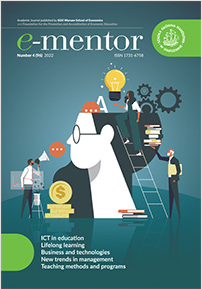External and global, or internal and local? Which main factors shape the organisational culture of shared service centres of transnational corporations in Poland?
External and global, or internal and local? Which main factors shape the organisational culture of shared service centres of transnational corporations in Poland?
Author(s): Maria NiewierkoSubject(s): Business Economy / Management
Published by: Szkoła Główna Handlowa w Warszawie, Fundacja Promocji i Akredytacji Kierunków Ekonomicznych
Keywords: organisational culture; factors shaping organisational culture; shared service center (SSC); parent company; globalisation
Summary/Abstract: Organisational culture has been the topic of research and in-depth analysis for around fifty years, emphasising the multifaceted nature and operationalisation challenges of organisational culture. Studies on its manifestations (i.e. values, behaviours, symbols) and functions have been conducted in relation to corporations, perceived as one entity rather than its subsidiaries. The aim of this article is to investigate the factors shaping the organisational culture of the growing number of shared service centres (SSC) of transnational corporations in Poland, an area that has not yet been thoroughly explored. The article is both theoretical and empirical, with the theoretical part devoted to the characteristics of the growing numbers of SSCs in Poland and a comprehensive classification of environmental factors in which SSCs function, while in the empirical part the author conducted statistical tests regarding the choice of dominant factors shaping SSC culture. A practical dimension of the study is the ranking list of factors shaping the SSC organisational culture: at the top of the rank are the factors related to the activity profile (both for the SSC and parent company) and human capital factors (age, competences, qualifications, employee gender both for the SSC and the parent company). The reverse approach to culture, concentrating more on the process of shaping it rather than an analysis of the actual state and the specificity of the culture, brings added value to the study.
Journal: e-mentor
- Issue Year: 96/2022
- Issue No: 4
- Page Range: 48-59
- Page Count: 12
- Language: English

